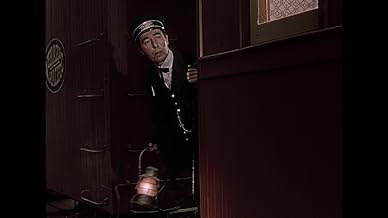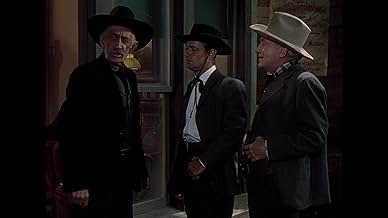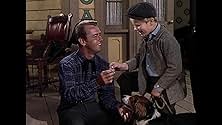NOTE IMDb
6,6/10
1,5 k
MA NOTE
Ajouter une intrigue dans votre langueLegendary railroad detective Whispering Smith becomes convinced that old friend and colleague Murray Sinclair has joined a criminal band to loot the railroad.Legendary railroad detective Whispering Smith becomes convinced that old friend and colleague Murray Sinclair has joined a criminal band to loot the railroad.Legendary railroad detective Whispering Smith becomes convinced that old friend and colleague Murray Sinclair has joined a criminal band to loot the railroad.
- Réalisation
- Scénario
- Casting principal
- Récompenses
- 1 nomination au total
Ward Wood
- Leroy Barton
- (as Robert Wood)
Eddy Waller
- Conductor
- (as Eddy C. Waller)
Avis à la une
Alan Ladd's first film in color was also his first Western, a genre with which he would become associated after making 11 of them in all (having previously excelled in noirs during the 1940s and early 50s). Here he plays a character dating back to the Silent era: a soft-spoken (hence the title) but sharp-shooting investigator for a railroad company which also employs his best friends rugged foreman Robert Preston (who married Ladd's girl Brenda Marshall) and old-timer William Demarest. With Ladd away on company business i.e. chasing a notorious trio of sibling train robbers, Preston falls in with a bad crowd headed by cattle rustler Donald Crisp and his albino henchman Frank Faylen and, on whose account, he has been pilfering 'damaged' goods transported by the railroad. Ladd is ordered back home to look into this wave of train wrecks which have been occurring on a regular basis. Suspecting Crisp and his crew, he pleads with Preston to pull out in time but the latter is too deeply involved by now to listen and an eventual shootout between the two childhood friends is inevitable. An ordinary, unpretentious Western to be sure but one that is well acted, competently staged and provides consistent entertainment for the undiscriminating viewer and Western film buffs in particular.
One of Alan Ladd's first starring films is this entertaining detective western as a railroad investigator assigned to solve the mystery of a rash of train robberies. The detective investigates an old friend whose fine ranch and well-to-do lifestyle are not in accord with his workman's salary, which is the main plot angle. The picture is more of a mystery than a typical western and Ladd's inclination to underplay his scenes gives his character credibility. Ladd's deceptively easygoing portrayals in westerns made him one of the most popular actors of his time. Robert Preston is also good in a role that he seemed to relish, an ethically-compromised man who knew right from wrong but did the devil's work because he thought he could get away with it. Brenda Marshall is lovely as a married woman who still carries a torch for her one-time suitor. The cast is good, as is Ray Rennahan's camera work and Adolph Deutch's music accompaniment.
In "this gun's for hire" ,Robert Preston was Veronika Lake's co-star whereas Alan Ladd was supporting.But when you see that movie today you realize that ,although the credits mention "introducing A.L." ,his part was much more "written" ,more important than that of the lead.
In "whispering Smith" ,the roles are reversed:not only Ladd plays the lead ,but he has also the part of the good guy whereas Preston is supporting and gets the role of the villain.It's a routine western with a derivative screenplay:the umpteenth story of the pretty girl who married the wrong guy and see the other one come back into her life.The talents of the actor ,with many fine supporting performances (particularly Donald Crisp and Fay Holden who sings a duet with Ladd) make the movie watchable though.
In "whispering Smith" ,the roles are reversed:not only Ladd plays the lead ,but he has also the part of the good guy whereas Preston is supporting and gets the role of the villain.It's a routine western with a derivative screenplay:the umpteenth story of the pretty girl who married the wrong guy and see the other one come back into her life.The talents of the actor ,with many fine supporting performances (particularly Donald Crisp and Fay Holden who sings a duet with Ladd) make the movie watchable though.
This is a very fine western. Great Technicolor, decent acting and a nice plot. As a fan of the western genre, I appreciate the snappy way the story moves along. Modern westerns (and most films, in fact) drag the exposition out. Here, for example, when Robert Preston's character meets up with his old friend Ladd and mentions Preston's wife's name, the look on Ladd's face instantly tells you "oh-oh, there's a history here." Very quick, but well done and you know what's coming.
This is a "railroad western." It's nice to see a western that emphasizes the importance and power of the the railroads in the settlement of the west.
This is a "railroad western." It's nice to see a western that emphasizes the importance and power of the the railroads in the settlement of the west.
Whispering Smith is directed by Leslie Fenton and co-adapted to screenplay by Frank Butler and Karl Kamb from Frank H. Spearman's novel. It stars Alan Ladd, Robert Preston, Brenda Marshall, Donald Crisp, William Demarest and Frank Faylen. Music is by Adolph Deutsch and cinematography by Ray Rennahan.
Famed railroad detective Whispering Smith (Ladd) becomes conflicted when his latest case pits him up against one of his best pals.
It's somewhat surprising to find Whispering Smith is not more well known, given that it's Ladd's first full length Western feature and that it's really rather good. With its opening scene of Ladd riding towards camera, with glorious landscape in the background, and the thematics of how Smith operates around women and children, this signposts towards Shane five years down the line. In fact this very much works as a tasty appetiser for that superb 1953 picture.
Ladd cuts a fine figure as Smith, giving him the right amount of calm toughness so as to not over play the role, and Preston is on fine form, very ebullient and able to act heaps with only his eyes. Marshall on the surface doesn't impact greatly, in what is a key role, but the character is very shrewdly written and sits in the story as more than a token. The villains headed by Crisp are not very inspiring, while Faylen looks laughably out of place with a blonde wig!, but with Preston erring on the side of badness the good versus bad axis of plotting thrives well enough.
Pic is filled with a number of shoot-outs, banditry and awesome locomotive action, all set to the backdrop of beautiful - Technicolor enhanced - California locales. The running theme of railroad progression in the West is interestingly written, managing to not take sides and let the viewer enjoy both sides of the coin, though a moral equation that Smith ultimately arrives at doesn't quite add up. Add in Fenton's unfussy direction, Rennahan's location photography (see also night sequences) and Deutsch's pleasingly compliant score, and Western fans are good to go.
This doesn't pull up any tress or have the psychological savvy of what many Oaters of the next decade would explore, but it's very well mounted and engages from the get go. 7/10
Famed railroad detective Whispering Smith (Ladd) becomes conflicted when his latest case pits him up against one of his best pals.
It's somewhat surprising to find Whispering Smith is not more well known, given that it's Ladd's first full length Western feature and that it's really rather good. With its opening scene of Ladd riding towards camera, with glorious landscape in the background, and the thematics of how Smith operates around women and children, this signposts towards Shane five years down the line. In fact this very much works as a tasty appetiser for that superb 1953 picture.
Ladd cuts a fine figure as Smith, giving him the right amount of calm toughness so as to not over play the role, and Preston is on fine form, very ebullient and able to act heaps with only his eyes. Marshall on the surface doesn't impact greatly, in what is a key role, but the character is very shrewdly written and sits in the story as more than a token. The villains headed by Crisp are not very inspiring, while Faylen looks laughably out of place with a blonde wig!, but with Preston erring on the side of badness the good versus bad axis of plotting thrives well enough.
Pic is filled with a number of shoot-outs, banditry and awesome locomotive action, all set to the backdrop of beautiful - Technicolor enhanced - California locales. The running theme of railroad progression in the West is interestingly written, managing to not take sides and let the viewer enjoy both sides of the coin, though a moral equation that Smith ultimately arrives at doesn't quite add up. Add in Fenton's unfussy direction, Rennahan's location photography (see also night sequences) and Deutsch's pleasingly compliant score, and Western fans are good to go.
This doesn't pull up any tress or have the psychological savvy of what many Oaters of the next decade would explore, but it's very well mounted and engages from the get go. 7/10
Le saviez-vous
- AnecdotesThe railhead town site was constructed on the Paramount lot adjacent to the neighboring RKO Pictures studio. It became the basis for what would go on to become Paramount's famous western town set as seen in TV's Bonanza (1959) and numerous other TV shows and movies. Prior to 1948, Paramount didn't have a western set on its studio lot. A short line of track was laid down that allowed a working period locomotive to pull into town.
- GaffesWhen Smith shoots his horse, the shadow of the dollying camera can be seen crossing his arm.
- Citations
Murray Sinclair: Guys like Smitty they don't make anymore!
- ConnexionsEdited into Seul contre tous (1954)
- Bandes originalesLaramie
Written by Jay Livingston and Ray Evans
Meilleurs choix
Connectez-vous pour évaluer et suivre la liste de favoris afin de recevoir des recommandations personnalisées
- How long is Whispering Smith?Alimenté par Alexa
Détails
- Durée1 heure 28 minutes
- Rapport de forme
- 1.37 : 1
Contribuer à cette page
Suggérer une modification ou ajouter du contenu manquant

Lacune principale
By what name was Smith le taciturne (1948) officially released in India in English?
Répondre

































